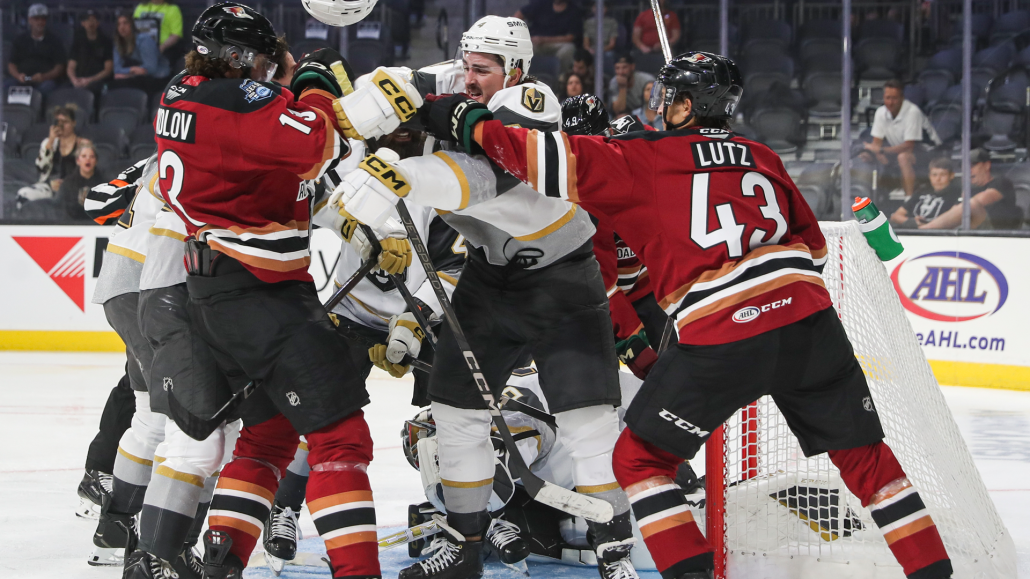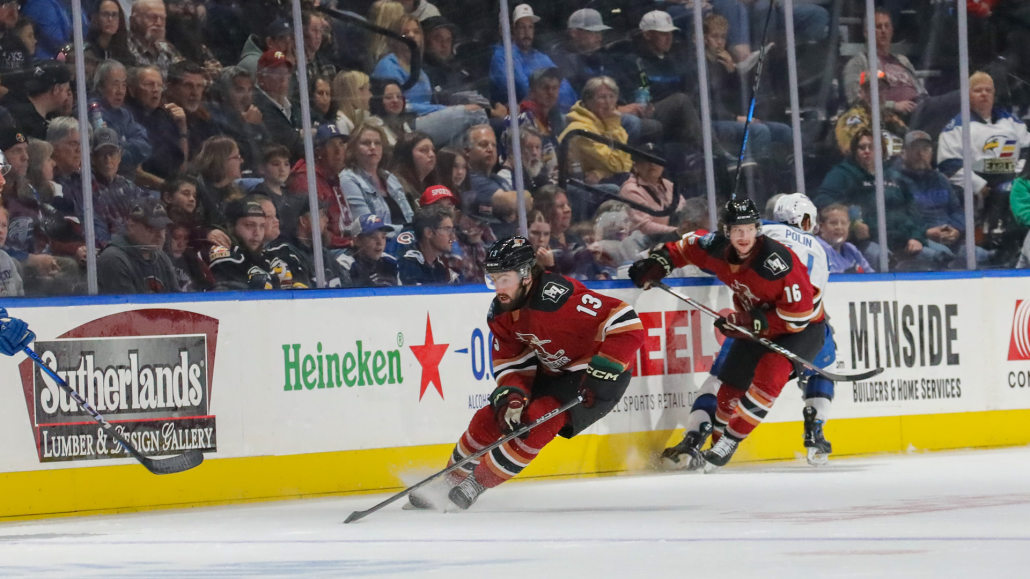1-On-1: with Egor Sokolov
Roadrunners Forward Egor Sokolov joined Jonathon Schaffer and Kim Cota-Robles on this week’s Happy Hour Show. For the complete conversation and to hear about Egor’s song of the summer, download this week’s show below.
Listen to “The New Guy From Yekaterinburg” on Spreaker.
How has the transition to Tucson been? You guys had a pretty physical practice today.
It’s been a lot of fun; new organization, new beginning for me. I’ve been pleased so far. Yeah, it was a tough practice out there today for sure. We have a lot of time to recover before the first game. So, it’s good to get that stuff out of the way for this week. I’m just excited for the next games, that’s the main focus, right?
Tell us a little bit about growing up in Russia. Your hometown is Yekaterinburg?
Yeah, Yekaterinburg. I grew up there, and then when I was 13, I moved to another city in Russia. It’s called Chelyabinsk. As a 13-year-old, I made my way over there, by myself, without my parents. It was only a two-hour drive, but my parents couldn’t be there all the time. I lived in a house where there was a few of us guys from different cities. We had a chef who cooked meals and people who looked after us. They made sure we were going home on time and stuff like that. We didn’t have billet families in Russia; it was about 13 or 14 of us in the house. It was like a school, a hockey school. You start young, at six or seven years old, you become a team with guys your age and you just grow together and play every year together. You get different guys, but most of the core is like, “if I’m from this town, I’ll be there.” There are rarely guys making moves. I was one of the guys who made a move. The team I went to was ranked probably first in Russia in our age group. I had to try to move on because I was really dominant in Yekaterinburg, but our team wasn’t so good. I played four years there, became a captain on that team, everything progressed really well. So, at 17, I had to make a decision if I want to continue to play at home or I want to try to play in North America. It was a tough decision and obviously, I decided to come over. I played three years in Cape Breton, in the QMJHL, and then so my first and second year I went undrafted in the NHL draft and then my third year of eligibility, I got drafted in the second round by the Senators. Since then, I played for four years in in Senator’s organization; got my first NHL game and first NHL goal. I thought for me in general, I just needed a new opportunity somewhere else. Obviously, the trade happened and it just happened to be here.

How did you and your parents decide that hockey was going to be your sport? Do they have any ties to hockey?
So honestly, my parents have nothing to do with hockey. My mom played a lot of sports growing up and she played professional badminton, so she was a really good player. I played against her a couple of times and I was just there sweating and she’s fine. When I was growing up, I was really big, just bigger than everybody else in my age group. So, she was like, we have get you in a physical sport. They put me on the skates at five and I absolutely hated them for that. I was a really bad kid, I was just crying all the time, I would be standing by the boards and my mom would take my fingers off the board and say “go skate, go skate.” When when I turned seven, and I started skating and we got the pucks and like all of the sudden I’m good. I thought “this is actually something I can do.” And then and then it since I turned nine or 10, I was pretty dominant in my age group and then I think when I made that move as a 13-year-old, I knew hockey is going to be part of my life. If you’re making that decision as a 13-year-old, going away from your mom and dad, and obviously, as a 17 going across the world, you know you have to be thinking that it’s going to be something that you’re going to do your whole life. But yeah, my mom is a schoolteacher, and my dad runs businesses back home. They have nothing to do with hockey, and nobody in my family besides my brother play.
What kind of differences have you noticed about playing on the East Coast, where you were before, and the west coast, where you are now?
Honestly, when we played against Colorado, a lot of guys warned me that they’re a hard team to play in their own building. I definitely noticed how hard they come out, and I’ll compare them to a team that I played against the last four years, the Syracuse Crunch, they came out in their building so hard every game. You get in on Tuesday night, it’s a Wednesday night game, and you just come out there and you know you’re going to get banged up. But there’s a lot of good players on both sides, and obviously, I haven’t gotten the full experience yet. It’s only been two games, but Colorado’s a pretty good team, if you ask me.

What is your favorite thing about playing hockey?
I would say winning. But winning is obvious. I think the friendships you build with the guys. Now looking back, I got traded to the new team and I’m still talking to so many guys from Belleville. All those guys who were in Belleville, they knew that I got traded, they were at my wedding. I think about it now, we played together for 3 1/2 years, we went through a lot. Now I think “what’s going to happen if I get traded? Will we talk again?” and things like that. But we call each other every day and chat it up. I would say probably the friendships that we build are my favorite. A lot of guys don’t really have friends outside of hockey, which sounds crazy, but all my friends are hockey players and are involved in hockey. I think that is probably my biggest thing is friendship.
At 13, when you left home, were you still going to school at that point? And you said your mom is a schoolteacher?
Yeah, I had finished high school back home and I graduated from university and everything. Yeah, she’s a schoolteacher. She’s a gym teacher, so she works extra hard.



